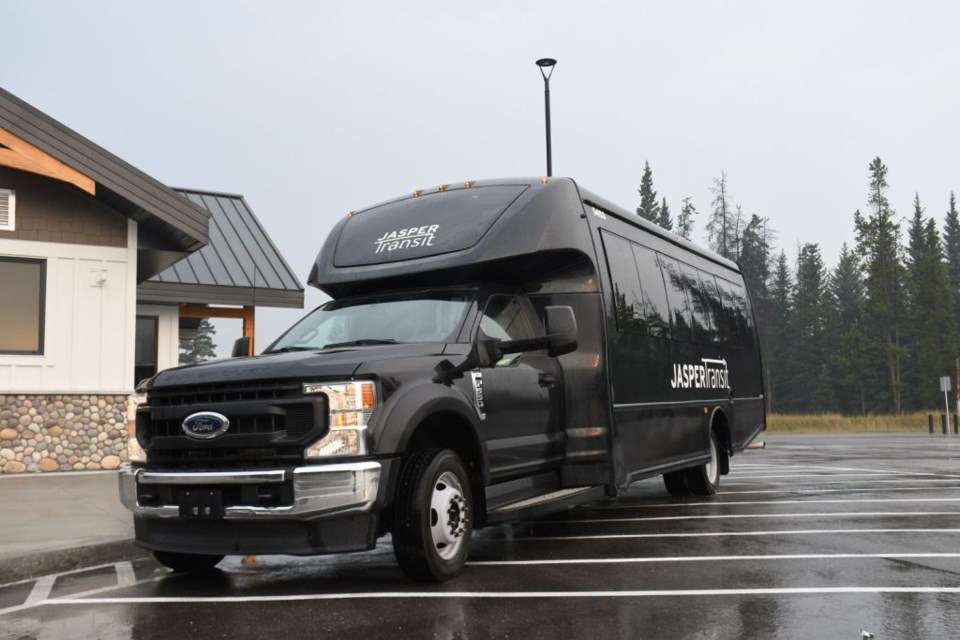Jasper Municipal Council will decide next week whether to issue a request for proposal for three electric buses and associated charging infrastructure.
The municipality currently pays a contractor to provide the bus fleet, fleet storage and driving.
“Moving towards an ownership model would mean that the municipality wouldn't have to pay a contractor to buy the buses because we would own them or the storage because we would have it, and we could reduce our contracted costs accordingly,” said CAO Bill Given during Tuesday’s committee of the whole meeting.
Over the 2026 to 2024 period, the transition to owning would result in a savings of $2,564,298 and provide the municipality with fleet facility that will have a lifespan of over 30 years.
The municipality is able to purchase the three electric buses with help from a $5-million federal grant.
Given highlighted how the Government of Canada and countries around the world have been pushing for a transition to electric in order to reduce greenhouse gas emissions.
“The transition towards zero-emission vehicles is well underway, not just in Canada,” he said.
“Again, I think there may be some suggestion that Canada is [in] a current political situation and then that might change. That is, of course, entirely possible. Governments can change their direction. But as you can see globally, there is also this movement, which means that more and more production will start to shift towards zero-emission vehicles.”
The proposed procurement has faced local pushback, including a petition with over 600 signatures and a separate letter from the Jasper Park Chamber of Commerce.
A main concern was the reliability of electric buses, particularly as Edmonton, St. Albert and the Bow Valley recently faced issues with their electric buses.
Given noted that those issues were related to a specific company called Proterra, which recently faced bankruptcy and resale.
“They were having cash-flow difficulties, which made it difficult for them to supply the parts that were needed to meet their commitments to transit agencies,” he said.
“So, certainly, those were electric buses – absolutely, no question. But I think we need to make a distinction between the technology and the company selling that technology.”
He added that many Canadian transit agencies were still planning to procure electric buses as part of broader zero-emission initiatives.
The City of Calgary, for example, is purchasing 259 electric buses.
In the Bow Valley, Roam Transit has 10 fully battery electric buses running year-round with three new battery electric buses due to arrive in spring 2025. Three large coaches are also on order, with delivery expected in fall 2024.
BC Transit is acquiring 66 new electric buses to serve nine communities across British Columbia and is committed to achieving a completely zero emission fleet by 2040.
According to the Canadian Urban Transit Research and Innovation Consortium (CUTRIC), two 30-foot battery-electric buses will have sufficient range to serve Jasper’s current routes and schedules.
CUTRIC also estimated that two such buses using Alberta’s current grid power would reduce greenhouse gas emissions by around 30 tonnes per year.
The same two buses using Alberta’s future grid power would reduce greenhouse gas emissions by around 40 tonnes per year.
The incremental cost increase of the electric configurations compared to the gasoline base case is $2,125,096, specifically for an electric bus heated by diesel.
However, administration stated that the $2,564,298 in savings for transitioning to an ownership model was still greater than the $2,125,096 cost of transitioning to an electric bus fleet.
This results in a net financial benefit of $474,245 for the municipality.
The proposed transit facility would also have a solar array, which could help offset some of the energy cost for the facility and bus charging.
To ensure a fair and competitive procurement process, administration cannot specify a preferred model or brand of bus in the request for proposals, but it will include expected minimum and maximum standards.
These standards specify, among other requirements, that the buses must have 22 to 35 seats, be between 28 to 35 feet in length and have a battery capacity of 250 to 450 kWh.
Coun. Helen Kelleher-Empey expressed hesitancy about the procurement and floated the suggestion of asking the federal government for an extension or perhaps holding a plebiscite on the issue.
Coun. Wendy Hall expressed more optimism about getting electric buses.
“And there's a lot of talk about backup plans for this and what if this happens, but what if this is amazing? Like, honestly, this is amazing. This could be the most amazing thing we've ever done.”
Coun. Ralph Melnyk supported the motion but noted that he wanted to see more information about maintenance costs, putting away money for purchasing buses, insurance and other related costs.
Transit fleet facility
Council will also decide next week whether to award Johnston Builders a $3,204,123 contract for constructing the new transit fleet facility, inclusive of the optional solar array.
Administration posted a request for proposal on March 21 that later closed on May 10, and six proposals were received.
“Johnston builders submitted a design that meets all the technical specifications coming out of our scoping study,” Given said.
“And they also offer … a development timeline that will see the majority of construction take place through the fall and winter of this year, with completion prior to the summer season of next year.”
The design for the facility is a simple and functional, pre-engineered steel frame building.
The total projected cost is $3,499,373, which includes $3,204,123 for the base contract and an additional $295,250 as a contingency and cash allowance.
Eighty per cent of the funding will be sourced from the federal grant while the remaining amount will come from municipal borrowing.
The grant portion will represent an amount of $2,799,498.
While committee recommended council award the contract, it also asked administration to structure the contract so they would only be committing to the design phase.




